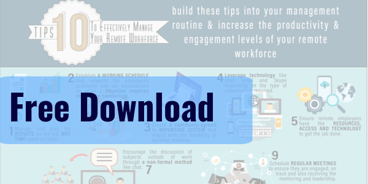Developing Leaders for the “New Normal”

As we enter the second stage of work transformation as a result of global disruptions due to the COVID-19 pandemic, businesses and leaders need to start really thinking about what they will do to develop leaders in this ‘new normal.' What had been previously seen and expected in leadership and management practices must be adjusted, re-learned, or tossed to better fit the working and living conditions we have today. New leadership needs to focus on how to lead a distributed workforce, how to appreciate and capitalize on new global opportunities, and how to lead with human capital leadership skills (empathy, emotional intelligence, and autonomy management).
Working in a distributed workforce
It used to be that only global organizations had a distributed workforce; meaning, one that worked in different time zones, locations, or at various times of the day. Today, with the rise of work-from-home and the ability to work when your clients are available, this is a different story. In developing leaders to work with a distributed workforce, some new skills and perspectives should be included.
New leaders need to learn how to communicate with their teams in a way that best suits the work being done. Where a leader could have easily walked through the rows of desks, offices, or cubicles in days past to see employees working, the new normal adjustment is keeping track of progress based on projects or tasks, not in hours spent in front of the computer screen. Unless you are in a service-based business where your employees need to be ‘at the ready’ to help clients (think restaurants, call centers, the local garage, hospitality businesses) your employees should be able to show their work effort in the completion of tasks or projects. This comes down to a mindset shift – are you paying your employees for the hours of labor they perform, or for their skill and expertise in completing work products?
The mindset shift of working with people who are being paid for their expertise also shifts the way you communicate with them, the intentions of why and how you communicate, and the frequency with which you need updates. Giving employees the ability to work when they are best able and in ways that produce results of quality with speed is a shift that can be enhanced with communication and leadership training.
To help build leaders for tomorrow, start thinking about the value of the work being done by your employees in every role. Is the work valuable and does it contribute to the development and prosperity of the organization and the customers being served? Strategic thinking, business acumen, and an enhanced understanding of the role employees play in achieving the organization’s KPIs will strengthen leaders for the future and for today’s new normal.
Enriching your workforce with a Global perspective
The good thing about working in this ‘new normal’ is the ability to source great workers from wherever they are! While there is still a natural inclination for more businesses to seek candidates domestically, there is no longer a strict need to employ people only in the town or state where the head office is located. This is extremely good news for companies who run niche businesses or who need to have experts but can’t attract them due to geography. The net result is that smaller organizations could grow and expand their market share and workforce without the expense of relocation to a larger metropolis.
As a leader in the new normal, this brings a need for better planning, more concise prioritization of work and customer service, and better security in terms of information technology infrastructure. The days of not allowing an employee to work at home because of security concerns are gone. The new leader needs to be aware of cybersecurity and coach employees in how to keep company and customer information secure. To develop the new leader, engage in increased risk and security training as well as computer security training to learn more about threats and changes to systems used regularly.
Increased need for human capital leadership skills
As presented previously, to build resilience in new leaders and in the ‘new normal’ workplace, there is going to be an increasing need to develop leaders to manage more than just project deadlines, timecards, and budgets. Leaders are increasingly finding themselves in situations where they or their teams are feeling a lack of confidence, of being overwhelmed or being disconnected from each other and the world. Part of this is the isolation caused by lots of lockdowns and a lack of human interaction in general, but part of it is also in the loss of incidental relationships because of not being physically together.
In the world of the new leader, genuine relationships are increasingly more important. The new normal leader needs to be self-aware, empathetic, and approach employees as individuals, not just parts of the departmental machinery. They need to learn how to coach, listen with empathy, and communicate with genuine respect. These are skills, just like balancing a budget or planning a project. They can and should be taught at all levels of the organization. These skills should be reflected in the organization’s culture, not just in a leadership training program taught once a year.
Many news agencies are reporting the resignation of waves of employees across the globe, refusing to work for organizations that can’t respect the need for individuals to have autonomy over their work (because they are hired for their skills, not their labor), their time (because the work can and perhaps would be better done when the employee is most capable), and their location (because a computer can be opened and operated securely from most places that don’t require more than an hour’s commute). In the ‘new normal’ leaders will need to learn to think critically and strategically about why previous norms were accepted and consider how this new working world might benefit from a few changes.
Want to work on Leadership Development, or learn how to manage your remote workforce?
Get out FREE Download: '10 Tips to Effectively Managing Your Remote Workforce'


